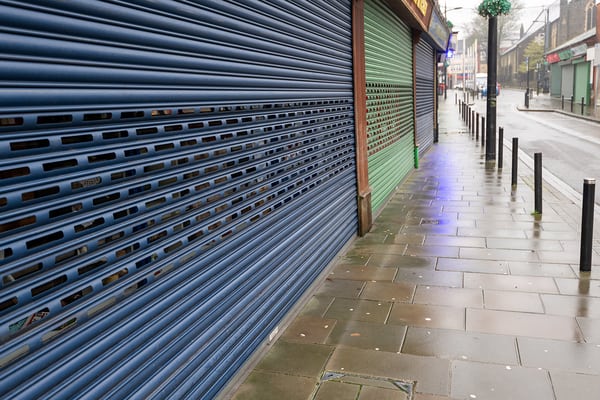The double whammy of Covid-19 accelerating the shift towards online shopping is shown today in the rising number of shops standing empty in the UK.
The overall UK store vacancy rate was 1.6 percentage points higher in the fourth quarter of 2020 than it was a year earlier, according to the British Retail Consortium (BRC) and Local Data Company (LDC).
Vacancies rose across retail sites, with shopping centre vacancies at 17.1% in the fourth quarter of last year, up from 16.3% in the third quarter. Rates also rose on high streets (13.7% Q3 from 13.3% Q4) and retail parks (10% from 9.2%), according to the latest BRC-LDC Vacancy Monitor.
“With the country in and out of lockdown, the forced closures of thousands of shops, and consumers reluctant to visit town and city centres, it is unsurprising that the number of shuttered stores continues to rise,” says Helen Dickinson, chief executive of the BRC. “”Over the past two years, one in every 50 outlets have permanently closed and this number will only go up.
|The big increase increase in vacancy rates during the crucial golden retail quarter, when demand is usually high, serves as a stark reminder of the pandemic’s impact. Social restrictions and their knock on effect on consumer appetite for fashion, has meant that shopping centres are still faring the worst due to their high proportion of clothing outlets. What’s more, due to economic uncertainty, many retailers have paused their plans for future investment in new stores.”
Dickinson argues that the government must extend business rates relief – introduced last March when the first lockdown was introduced – beyond April if shops are to survive.
The news comes in a week that Debenhams was bought by Boohoo Group, and is now set for an online-only future with its 118 shops closing with the loss of an estimated 12,000 jobs. The future of a further 13,000 jobs at Arcadia Group is still in the balance, as Asos discusses potentially buying Topshop, Topman, Miss Selfridge and athleisure brand HIIT. Yesterday, Paperchase was bought out of administration by a company backed by Permira Debt Managers, a move that is expected to save 90 of its 127 shops; the future of its concessions is still under discussion.
In 2020, more than 176,000 retail jobs were lost as an estimated 15,747 UK shops closed, according to the Centre for Retail Research.
Lucy Stainton, head of retail and strategic partnerships at the Local Data Company, says the latest figures show an acceleration in stores closing, hurried on by the Covid-19 pandemic. But, she says: “this number only reflects the very immediate impact of the pandemic on the retail market. Hundreds of thousands of stores have been struck by changing restrictions and many of these remained temporarily closed in the intervening periods between lockdowns. Therefore these businesses are not reflected in the permanent vacancy figures. With each round of restrictions, these ‘frozen’ units are less likely to reopen and so we’re predicting the compound effect of each lockdown being visible in later figures.
“Added to this, with recent announcements from the likes of Debenhams and Arcadia, the size of the stores coming onto the market will present a real challenge given the likely lack of demand for larger high street units. With a limited number of new store openings, structural solutions will need to be found to prevent these vacant units lying empty for two, three, four years or more. Looking further out, the increase in availability of space will provide opportunities for new businesses, however we must prepare ourselves for the picture to get worse before it gets better.”









